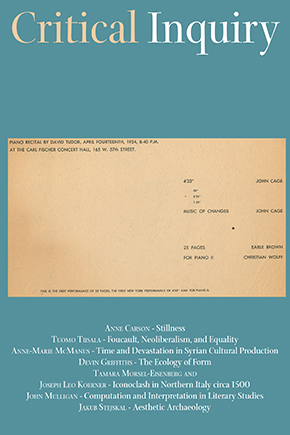On the Ruins of What’s to Come, I Stand: Time and Devastation in Syrian Cultural Production since 2011
Ten years after the popular uprising that became a brutal war, Syrian and Syrian-Palestinian authors are engaged in the struggle to craft a historical consciousness that can acknowledge and mourn for their recent revolutionary past without reifying it. As they write in and of material, political, and social ruin, their works echo collective traumas in regional memory: the Palestinian nakba, the rise of Syria’s Assad regime, Lebanon’s civil war, the 2003 occupation of Iraq, and more. The ruin appears cruelly recursive, yet it is arrested in the corpus of works discussed in this article: poetry by Firas Sulaiman and Osama Esber; prose by Yassin al-Haj Saleh, Samer Yazbek, and Ra’id Wahsh; and documentary film by the Abounaddara Collective. Drawing on Arabic poetic modernism and regional politics, I argue that ruin imagery—ranging from war’s rubble to ancient artefacts—carries distinctive structures of temporal anticipation in Syrian literary and cultural memory. The writers and filmmakers discussed deploy formal and thematic means of stasis and repetition, displacement and accumulation, to summon these temporal structures—only to refuse, interrupt, and reroute them. McManus argues that such poetic engineerings of the images of ruin assert the singularity of the Syrian present within broader collective memories of ruin. As such, they raise a historicizing challenge to the current academic dominance of reading ruin imagery, notably from the Middle East, through an imperial lens.


